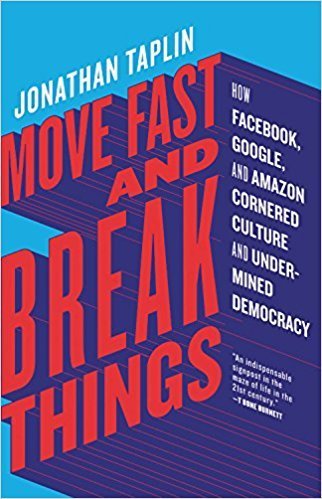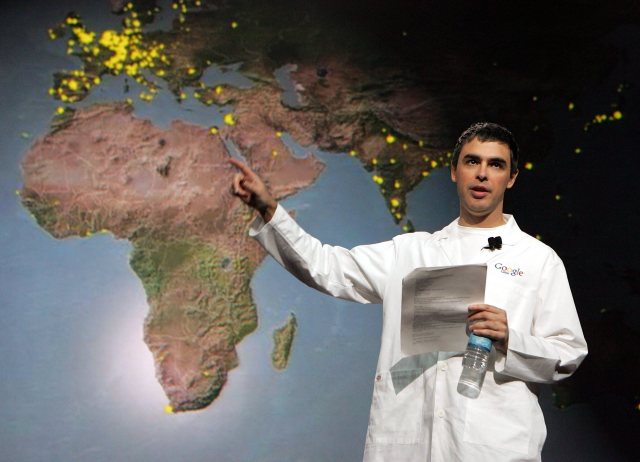Tech companies are the new monopolies and their leaders, like Google’s Larry Page, are the new Rockefellers. Credit: Ethan Miller / Staff

THIS IS THE TARBELL COLUMN – NAMED AFTER THE INVESTIGATIVE JOURNALIST, IDA TARBELL, WHO IS THE SUBJECT OF THIS SHORT FILM. MORE THAN A CENTURY AGO, TARBELL FOUGHT TO CUT BACK THE OCTUPUS-LIKE POWERS OF THE BIG BUSINESSES OF HER TIME – AND UNHERD HOPES TO EMULATE HER FIGHT FOR FREER, FAIRER ENTERPRISE TODAY.
Amazon accounts for 70% of e-book sales – and, beyond books, captures 51 cents of every dollar spent on-line across the United States. Facebook hosts 80% of mobile social traffic. Google controls 90% search advertising, across both Europe and the US.
These vast technological companies, lauded as symbols of wild success, are also powerful monopolies – and should be treated as such. That’s the blunt, uncompromising message of Move Fast and Break Things – by the US music-producer-turned-media-guru Jonathan Taplin.
“Move fast and break things,” declared Mark Zuckerberg in an interview back in 2009. “Unless you are breaking stuff, you are not moving fast enough.” Just five years earlier, Zuckerberg had started the all-conquering Facebook in his Harvard dorm room. By the time he coined the “break things” slogan, it had 300 million users, $500 million in revenue and was worth north of $6 billion.
Since then, Facebook’s stock market value has soared to far greater heights – around $370 billion at the end of 2016. Zuckerberg’s creation is among the five most valuable companies in the world, the others being Google, Amazon, Apple and Microsoft. Ten years ago, Microsoft was the only tech stock that made the world’s top five. These days, it’s the ‘tech giants’ that rule the world.

“Move fast and break things” was a rallying cry, used internally to motivate Facebook’s developers and executive team. But Taplin argues the phrase captures instead the malign impact of these companies.
“The modern world is defined by vast digital monopolies turning ever-large profits. Their unprecedented growth came at the heavy cost of tolerating the piracy of books, music and film while at the same time promoting opaque business practices and subordinating the privacy of individual users to create the surveillance marketing monoculture in which we now live.”
Taplin argues that “data is the new oil,” comparing web giants directly to John D. Rockefeller – who, by 1870, controlled 90% of US oil business. “Google and Facebook are also in the extraction industry,” he writes. “Their business model is to extract as much personal data from as many people in the world as cheaply as possible and resell the data to as many companies as possible at the highest possible price.”
Their dominance has been driven by a ‘lax attitude’ towards posting content created, paid for and owned by others – be it journalism, music or other digital content. He also accuses the tech behemoths of legal, but questionable large-scale tax avoidance.
As a former music producer – who has worked with the likes of Bob Dylan and George Harrison –Taplin tells of how the story of how Google came to dominate the music business when it bought YouTube in 2006. “Just about every single tune in the world is available on YouTube as a simply audio file, most of them posted by users.” While such postings clearly breach copyright, Google is protected by the Digital Millennium Copyright Act, signed in 1998 by President Bill Clinton. Under DMCA, the tech giants can “pretend not to know there is infringing material being uploaded by users”, says Taplin, as long as they remove or block access to the material once they’ve been notified.
Musicians are constantly filing take down notices, but any links that are removed or blocked can be quickly replaced by others. As such, Google keeps making money not just from the traffic clicking on pirated music sites but from selling data about that traffic.
Taplin holds a candle for the newspaper business, too – which has seen the bulk of its advertising revenues shifting to Google and Facebook, hollowing out the ability of journalists to properly inform the public, while holding local and national politicians to account:
The disruptors of Silicon Valley have a very high opinion of their place in history and the role of technology in forcing change and evolving the economy. But has the wholesale destruction of the newspaper industry been followed by the establishment of a more reliable source of local and global news – or has it just resulted in noise and confusion?
The rise of the internet has not delivered greater productivity and improved living standards, according to Taplin – quite the contrary. “Unlike the years of more than 6% growth spurred by twentieth century innovation cycles (electricity, communication, transportation), the digital revolution is delivering less than 2% growth and increasing inequality.”

It is easy to dismiss Taplin as dystopian, but his observations are too sharp, his book too well- researched for that. And the story of monopolistic tech giants is part of a broader emerging picture, of increasingly powerful corporations, insulated by a combination of technology and political patronage, from genuine competition.
“In the last decade, the number of major US airlines has dropped from nine to four,” wrote Senator Elizabeth Warren in June 2016. “The four left standing control over 80% of all domestic airline seats in the country … and a handful of health insurance giants control over 83% of the country’s health insurance market.”
In the UK, too, there are unmistakable signs of growing monopoly power. A recent report from the Social Market Foundation, a centrist think-tank, suggests that eight of ten consumer markets examined were “concentrated” – including telecoms, banking and energy – dominated by a small number of large companies. On both sides of the Atlantic, then, there is a growing awareness that, if capitalism is to work properly, and retain broad consent, a spate of Theodore-Roosevelt-style “trust-busting” may be required.
The tech giants have worked hard to retain public affection. But with Google recently fined by the EU for unfair treatment of advertisers, and Facebook accused of subverting democracy, there are signs – Taplin’s book among them – that such affection is starting to wane.
And, significantly, old media is starting to fight back. Established newspapers, while reliant on Facebook, Google and others to distribute their content, are starting to engage in a war of words. The charge has been led by Rupert Murdoch’s News Corp, among the largest publishers of newspapers in the world. Accusing Google and Facebook of “manipulating algorithms” to favour their own subsidiaries, News Corp also blames them for the spread of “fake news.” Both companies “could have done far more to highlight that there is a hierarchy of content,” says News Corp CEO Robert Thomson. “But, instead, they have prospered mightily by peddling a flat earth philosophy that doesn’t wish to distinguish between the fake and the real because they make copious amounts of money from both.”
Journalist Ida Tarbell wasn’t intimidated by the large, politically-connected business interests of turn-of the century America. Her reporting was what eventually forced Roosevelt to take the antitrust action that led to the break-up of Rockefeller’s Standard Oil. Tarbell, though, was backed by powerful publishers, in an age of resurgent journalism – at a time when the US public got its news from a very broad range of sources. Can today’s media, hobbled by the internet, hold the tech giants to account? And will today’s politicians, themselves reliant on campaigns waged on social media, dare to ask tough questions?










Join the discussion
Join like minded readers that support our journalism by becoming a paid subscriber
To join the discussion in the comments, become a paid subscriber.
Join like minded readers that support our journalism, read unlimited articles and enjoy other subscriber-only benefits.
Subscribe